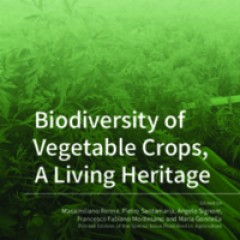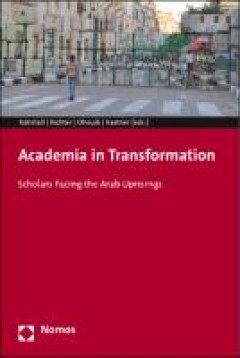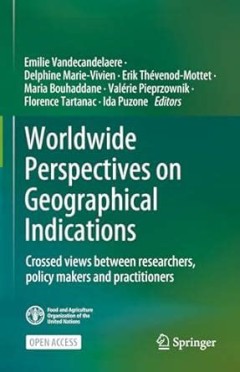Filter by

Biodiversity of Vegetable Crops, A Living Heritage
Intensive agriculture has generally resulted in higher productivity, but also in a trend towards decreasing levels of agro-biodiversity, which represents a key point in ensuring the adaptability and resilience of agro-ecosystems in the global challenge to produce more and better food in a sustainable way. The biodiversity of vegetable crops includes genetic diversity—both as species diversity…
- Edition
- -
- ISBN/ISSN
- ISBN 978-3-03897-721-6
- Collation
- 174
- Series Title
- -
- Call Number
- -

Armed Conflict and Environment
This study is the first to analyse the manifold interrelations between armed conflicts and the human and natural environments both historically and sociologically. While most research to date has dealt with this topic primarily with regard to environmental destruction caused by acts of war or armament in peacetime, this publication goes one step further by highlighting the historical changes to…
- Edition
- -
- ISBN/ISSN
- 9783845293868
- Collation
- oer.unej.ac.id
- Series Title
- -
- Call Number
- -

Argentine Cinema and National Identity
Argentine Cinema and National Identity covers the development of Argentine cinema since the late 1950s to the mid-1970s, a period that has been understudied. This essential cultural history delves on the dialect tradition versus modernity that was in place during those years and also comprises an examination of the political economy of film production as well as the different laws, including th…
- Edition
- -
- ISBN/ISSN
- 9781786948267
- Collation
- oer.unej.ac.id
- Series Title
- -
- Call Number
- Digital, video and new media arts

Biocontrol via mycoviruses: a neglected option for bioprotection?
Virocontrol involves biocontrol of pathogens via hypovirulence-causing mycoviruses. This chapter discusses the characteristics of mycoviruses and the conditions that need to be met to make a successful virocontrol agent. The chapter describes one of the success stories so far, that of virocontrol of Cryphonectria parasitica, the chestnut blight pathogen. The chapter ends by reviewing future tre…
- Edition
- -
- ISBN/ISSN
- 9781801461481
- Collation
- 44
- Series Title
- Burleigh Dodds Series in Agricultural Science
- Call Number
- -

Biocontrol of Plant Diseases: Antagonist Microorganisms, Biostimulants, Induc…
Biocontrol of plant diseases is considered one of the most important and current challenges of our society due to the need to look for eco-friendly alternatives to chemicals. Thus, research towards the biological control sensu lato [antagonist microorganisms, biostimulants, Induced Resistance (IR)] of plant diseases is an urgent demand for the agro-food sector of the Euroregion as well as for o…
- Edition
- -
- ISBN/ISSN
- 9783036586908
- Collation
- 222
- Series Title
- -
- Call Number
- -

A global history of early modern violence
By expanding the geographical scope of the history of violence and war, this volume challenges both Western and state-centric narratives of the decline of violence and its relationship to modernity. It highlights instead similarities across early modernity in terms of representations, legitimations, applications of, and motivations for violence. It seeks to integrate methodologies of the study …
- Edition
- -
- ISBN/ISSN
- 9781526140609
- Collation
- 320 hlm
- Series Title
- -
- Call Number
- -

Achievements in breeding cereals with durable disease resistance in Northwest…
Breeding cereals in Northwest Europe for durable resistance has made an important contribution to control of almost all economically significant diseases and pests of wheat, barley and oats. Durable resistance to fungal diseases is largely polygenic and quantitative, with the important exception of mlo resistance to powdery mildew of spring barley. Resistance to powdery mildew of winter wheat, …
- Edition
- -
- ISBN/ISSN
- 9781801462501
- Collation
- oer.unej.ac.id
- Series Title
- Burleigh Dodds Series in Agricultural Science,
- Call Number
- Agronomy and crop production

Academia in Transformation
Popular uprisings in the Middle East and North Africa (MENA) have had a deep impact, not only on the societies and political structures in the respective countries there, but also on different academic disciplines. The events that started in 2010 in Tunisia have altered academic terminology, contributed to a shift in study focus and sometimes challenged dominant theoretical approaches. The book…
- Edition
- -
- ISBN/ISSN
- 9783845274348
- Collation
- oer.unej.ac.id
- Series Title
- -
- Call Number
- Agriculture and farming

A Country of Shepherds : Cultural Stories of a Changing Mediterranean Landscape
This book draws on the life stories told by shepherds, farmers, and their families in the Andalusian region in Spain to sketch out the landscapes, actions, and challenges of people who work in pastoralism. Their narratives highlight how local practices interact with regional and European communities and policies, and they help us see a broader role for extensive grazing practices and sustain…
- Edition
- -
- ISBN/ISSN
- 978-1-80511-208-2
- Collation
- 258 hlm
- Series Title
- -
- Call Number
- -

Worldwide Perspectives on Geographical Indications = Crossed views between re…
Geographical Indications (GI) are distinctive signs that associate products of quality and reputation with their place or area of production and thereby help identify and distinguish such products on the market. In July 2022, the Food and Agriculture Organization of the United Nations (FAO) and the Centre de coopération internationale en recherche agronomique pour le dével oppement (CIRAD)…
- Edition
- -
- ISBN/ISSN
- 9783031716416
- Collation
- XXII, 394 hlm; ill., lamp.,
- Series Title
- -
- Call Number
- -
 Computer Science, Information & General Works
Computer Science, Information & General Works  Philosophy & Psychology
Philosophy & Psychology  Religion
Religion  Social Sciences
Social Sciences  Language
Language  Pure Science
Pure Science  Applied Sciences
Applied Sciences  Art & Recreation
Art & Recreation  Literature
Literature  History & Geography
History & Geography